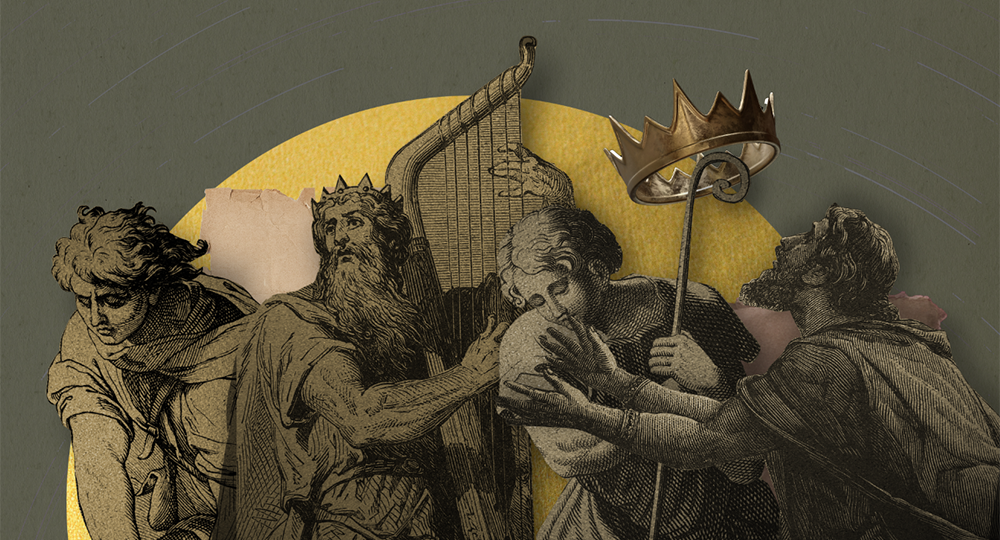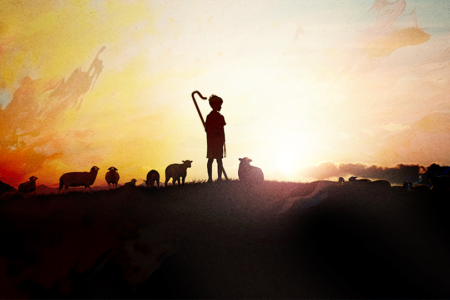The Many Faces of David
A bird’s-eye view of the life of David, one of Scripture’s greatest heroes
How do you encapsulate the biblical hero David? The “man after [God’s] own heart” (Acts 13:22) was a lowly shepherd and an exalted king. He was a depraved sinner and a godly saint. He was a man of war and a man of meek and quiet spirit.
Aside from Jesus Christ, David distinguished himself as perhaps the most important man in the entire Bible. We see no clearer picture in Scripture of a person’s sojourn on Earth, from youth to death, than that of David.
The entire book of 2 Samuel and much of 1 Samuel and 1 Chronicles record his life and reign as king of Israel. But because these books and their dozens of chapters overlap chronologically, keeping the account of his life sequential and gaining insight and godly instruction can prove challenging. We can better understand David by tracing six major distinctions that characterized him.
Shepherd
David’s story began when the life of his predecessor, King Saul, fell apart. Saul’s sins of disobeying the Lord by (1) acting as a priest and offering a sacrifice (1 Sam. 13:1–14) and (2) sparing Israel’s enemies, the Amalekites (chap. 15), caused the Lord to replace him with a man after His own heart.
The prophet Samuel found that young man, David, tending sheep. David ranked at the bottom of the family totem pole, the youngest of eight brothers. But God instructed Samuel to anoint him as the second king of Israel.
Soon afterward, David faced a literal giant. The 9-foot-9-inch Philistine Goliath mocked Israel’s armies and its God. But David drew on his experiences as a shepherd to boldly challenge the giant, telling Saul,
Your servant used to keep his father’s sheep, and when a lion or a bear came and took a lamb out of the flock, I went out after it and struck it. . . . Your servant has killed both lion and bear; and this uncircumcised Philistine will be like one of them, seeing he has defied the armies of the living God. . . . The LORD, who delivered me from the paw of the lion and the paw of the bear, He will deliver me from the hand of this Philistine (17:34–37).
Soldier
Defeating Goliath became the first of many battles David won through the Lord’s strength. Wearing no armor and using only a sling and a stone, David felled the most physically imposing warrior in either camp and claimed victory in God’s name (vv. 47–50).
From then on, his fame spread throughout Israel. Though the Israelites credited Saul with slaying thousands, they praised David for killing “his ten thousands” (18:7). David once killed 22,000 Syrians (1 Chr. 18:5) and defeated the Philistine armies many times (2 Sam. 21:15–22).
Before charging into battle, he habitually inquired of the Lord (1 Sam. 23:2–5; 2 Sam. 5:23–25), who granted him success and “preserved David wherever he went” (2 Sam. 8:6).
Psalmist
Despite his anointment and popularity, David spent several years fleeing for his life from Saul. He hid throughout the wilderness of Israel as he waited to be crowned king. During this time, he penned many of Scripture’s most beloved psalms; and about half of the 150 chapters that make up the book of Psalms are ascribed to him.
Many of David’s psalms cry out to God for deliverance. Others sing the Lord’s praises. Prior to Saul’s persecution of him, David enjoyed a special role as the king’s personal musician, playing the harp to comfort Saul when an evil spirit tormented him (1 Sam. 16:23).
The “sweet psalmist of Israel” (2 Sam. 23:1), David was an artistic man with a reflective heart, evidenced by both the content of his writings and his skill in music.
King
Many years after his anointing, David finally took the throne. He was 30 years old and reigned for 40 years (5:4), bringing military victory and stability to the burgeoning kingdom of Israel.
David made God’s holiness a theme of his kingship. He prioritized bringing the Ark of the Covenant to Jerusalem and expressed overwhelming joy when he accomplished the task (6:14). He also laid the plans for the great Temple that would serve as the hub of the Israelites’ worship of God.
However, as much as David wanted to build the Temple, he was forbidden from doing so. God told him, “You shall not build a house for My name, because you have been a man of war and have shed blood” (1 Chr. 28:3). That honor fell to David’s son Solomon.
Sinner
Solomon was born as a result of David’s most notorious sin. Remaining home while his men went out to battle, David saw from his rooftop a woman named Bathsheba bathing (2 Sam. 11:1–2).
Knowing her husband, Uriah, one of the king’s mighty men (1 Chr. 11:10, 41), was at war, the king sent for her; and she conceived his child (2 Sam. 11:4–5). To compound his sin, David then arranged for Uriah to be killed in battle; and David married Bathsheba.
God was not pleased. As punishment, the Lord did not allow the child to live and told David, “I will raise up adversity against you from your own house” (12:11). Consequently, trouble dogged David the rest of his life. His children’s rap sheets include rape (Amnon), murder (Absalom), betrayal, and rebellion against David’s reign (Absalom and Adonijah).
But God mercifully allowed Bathsheba to conceive again; and she bore Solomon, David’s successor. And the Lord loved Solomon (v. 24).
As king, David also sinned by demanding a census be taken to determine the number of Israel’s fighting men (chap. 24). Because the king trusted in his army’s strength more than in the Lord’s providence, God sent a plague that killed 70,000 Israelites (v. 15).
Saint
Yet, God loved David; and David truly loved God. David committed serious sins, but he always repented and turned to the Lord.
David captured the feeling of home he experienced in the Lord when he wrote, “You have been a shelter for me, a strong tower from the enemy. I will abide in Your tabernacle forever; I will trust in the shelter of Your wings” (Ps. 61:3–4).
In his great love for David, God promised him, “Your house and your kingdom shall be established forever before you. Your throne shall be established forever” (2 Sam. 7:16). This promise is called the Davidic Covenant.
A line of kings succeeded David on the thrones of what became the fractured kingdoms of Israel and Judah; but the Davidic Covenant’s ultimate, unbreakable fulfillment is guaranteed through Jesus Christ, David’s direct heir, born in Bethlehem, the city of David (Lk. 2:11).
Scripture prophesied about Jesus long before His birth (Isa. 9:6–7; 53:1–12) through the end-times (Rev. 11:15). His reign will endure forever, and His Kingdom will have no end (Lk. 1:33).
David was a man of many distinctions. But perhaps his greatest was that of saint—a title God bestows on all who trust in Him alone for their salvation.
Before David’s fame, one of Saul’s servants summarized the young man well: “A son of Jesse the Bethlehemite, who is skillful in playing, a mighty man of valor, a man of war, prudent in speech, and a handsome person; and the LORD is with him” (1 Sam. 16:18).
As David himself wrote, “My cup runs over. Surely goodness and mercy shall follow me all the days of my life; and I will dwell in the house of the LORD forever” (Ps. 23:5–6). The Lord remained with David all the days of his life—and will remain with him for eternity.
Photo: Adobe Stock









interesting 🤔